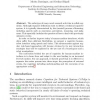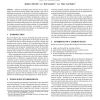8 search results - page 1 / 2 » Motives as intrinsic activation for human-robot interaction |
IROS
2008
IEEE
14 years 3 months ago
2008
IEEE
— For humanoid robots that should assist humans in their daily life the capability of an adequate interaction with human operators is a key feature. A key factor for human like i...
ICONIP
2009
13 years 7 months ago
2009
To achieve sustainable human-agent interaction (HAI), we proposed a new model of intrinsically motivated adaptive agent, which learns about the human partner and behaves to satisfy...
KI
2010
Springer
13 years 7 months ago
2010
Springer
Abstract. This paper presents a novel method for developing and evaluating intelligent robot behavior for joint human-robot activities. We extended a physical simulation of an auto...
HCI
2009
13 years 7 months ago
2009
Abstract. The archetype of many novel research activities is called cognition. Although separate definitions exist to define a technical cognitive system, it is typically character...
EGICE
2006
14 years 1 months ago
2006
Advances in intelligent agent research, such as curious agents and motivated learning agents, make possible a new kind of intelligent environment: a curious place. Previously, inte...


